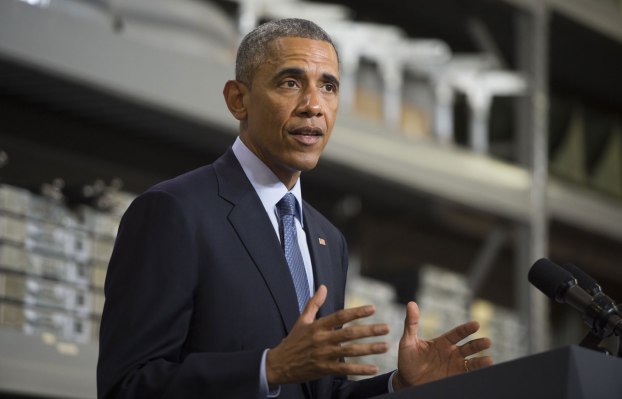Municipal broadband is a rapidly heating battleground among the president, his administration, and Congressional and FCC Republicans.
Should all cities and communities be free to build municipal broadband networks to serve their citizens? The issue is perhaps surprisingly contentious. In a speech this morning, President Obama called for a full-court press against rules that bar communities from constructing their own Internet networks:
“And if there are state laws in place that prohibit or restrict these community-based efforts, all of us, including the FCC, which is responsible for regulating this area, should do everything we can to push back on those old laws.”
According to the president this morning, 19 states have “laws on the books that stamp out competition, and make it really difficult for communities to provide their own broadband.”
The administration sent FCC Chairman Tom Wheeler a letter today outlining its arguments in favor of slashing restrictions that are currently in place. The letter notes massive private investment into broadband architecture, but goes on to argue that “there remain areas of our nation where private investment simply has not delivered broadband service adequate to meet the demand of local communities.”
Where that is the case, the letter argues, “communities can and should play a leading role in expanding broadband access.”
Chairman Wheeler has made comments sympathetic to the idea for some time, likely aligning the independent agency with the president. That’s not a big surprise. After all, the president nominated Wheeler.
Implicit to the current discussion is the concept of broadband competition. In the eyes of Chairman Wheeler, the more competition the better. And so if locations where community broadband saw those restrictions lifted, it’s reasonable to presume that aggregate competition would increase.
As The Hill reported earlier today, the FCC will hold a vote at its February meeting to see if it should “preempt two state laws restricting cities from building municipally owned high-speed Internet networks.” The Hill went on to state that an FCC aide had confirmed that the vote would take place.
At that same confab, the FCC will vote on its final net neutrality proposal. That makes the coming meeting something akin to the digital regulatory equivalent of the Super Bowl. I’ll make popcorn.
The two Republican commissioners of the FCC were quick to lash out at the idea.
As an independent agency, the FCC must make its decisions based on the law, not political
convenience. And U.S. Supreme Court precedent makes clear that the Commission has no authority to preempt state restrictions on municipal broadband projects. The FCC instead should focus on removing regulatory barriers to broadband deployment by the private sector.
It is clear that this Administration doesn’t believe in the independent nature of the FCC. It is disappointing that this Commission’s leadership is without a sufficient backbone to do what is right and reject this blatant and unnecessary interference designed to further a political goal.
Substantively, this missive is completely without statutory authority and would be a good candidate for court review, if adopted. In reality, this debate is about preempting a state’s right to prevent taxpayer rip-offs. Municipal broadband has never proven to be the panacea that supporters claim and the Administration now boasts. Instead, we have seen a long track record of projects costing more than expected, and delivering less than promised.
To sum: Either municipal broadband is a great way to help rural communities where large ISPs won’t invest, and a way to help increase competition in the market, or it is a taxpayer boondoggle, and the president’s wants are likely illegal to boot.
Presuming that the two Democratic commissioners are on board with the chairman, and he decides to hit go on pushing over state law to allow cities to build their own infrastructures, he has the votes. Viva la 3-2.
My take is boring and simple. As I wrote last August: “[I]f citizens want to come together and build a service for themselves using monies that they elect to raise, they should be able to. I struggle to understand how that idea is controversial.”
